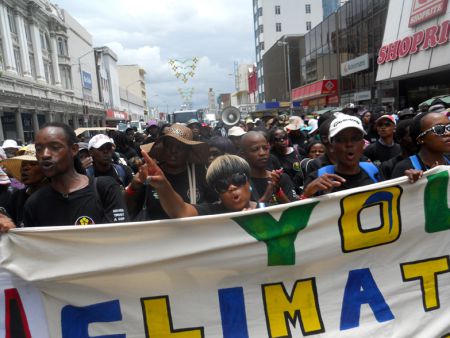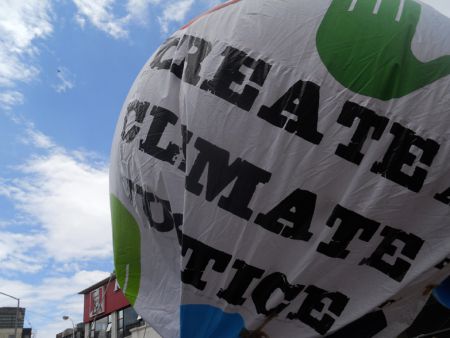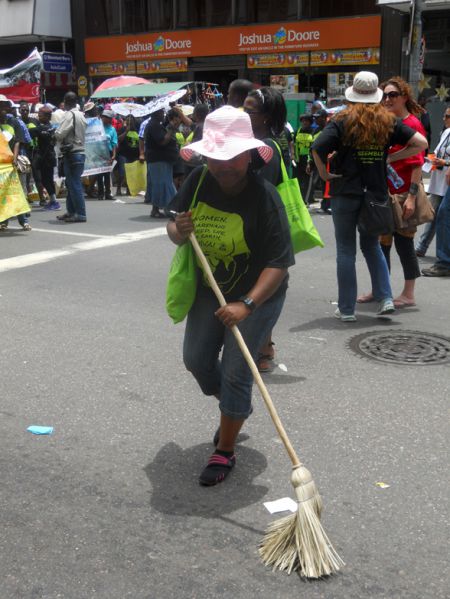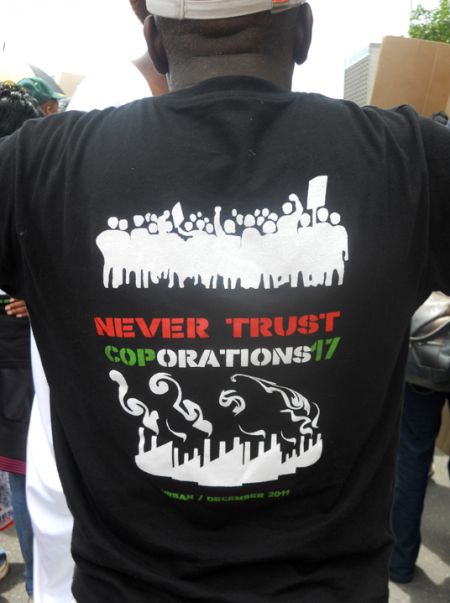More than 10,000 people answered the call to march through the streets of Durban, South Africa, last Saturday as part of a gobal day of action for climate justice and an end to climate change. The march coincided with the halfway point of negotiations at 17th meeting of the United Nations Framework Convention on Climate Change (COP17).
“We will not accept a continuation of pollution. We will not accept a 'horror' Durban mandate. We want legally binding emission reductions, at a level in line with the language of the COP: ambitious. We don't want business as usual, we don't want Africa to be cooked, we don't want Africa to be roasted, we don't want Africa to be burned. We the people of Africa demand that our leaders should hear us,” well-known Nigerian activist and chair of Friends of the Earth International Nniimmo Bassey said to the assembled crowd.
The climate activists marched through the downtown core, with riot police on all sides. At the conference centre where thousands of delegates are meeting for the official negotations, riot police on horseback were stationed behind the metal and concrete barriers encircling the entire space.
The gulf between those on the inside and those outside was an overwhelming theme of the march. Participants from across Africa and many who had travelled from across the world expressed disillusionment and frustration that once again world leaders were engaging in a negotiation process that excluded many of those who are already most affected by climate change and who face the most to lose should an agreement to reduce goblal warming not be reached at COP17. Some of the cynicism could be found on t-shirts that read "Never Trust a COP," and "Never Trust COPorations."
“We demand that countries acknowledge our collective rights as Indigenous peoples, respect our traditional knowledge, and that we be part of the negotations,” said Lola Cabanal, an Indigenous activist from Guatemala, marching with a No REDD (Reducing Emissions from Deforestation and Forest Degradation) banner.
Another prevailing theme was the feeling that even the solutions being proposed would aggravate the situation of climate change rather than alleviate it.
Both the flagship Green Climate Fund, meant to allocate financing for climate cahnge reducing projects, and the Reducing Emissions from Deforestation and Forest Degradation (REDD) agreement, meant to finance projects focussing on reforestation and conserving the world's forests, were roundly criticised by marchers. Signs denouncing the use of markets to reduce carbon emissions–for example, allowing coal companies to continue to mine while financing new reforestation projects–were prolific at the march. Such market mechanisms are currently integral to both the GCF and REDD.
“REDD is the WTO [World Trade Organization] of the sky: It's the privatization of trees, privatization of the soil,” said Tom Goldtooth, of the US-based Indigenous Environmental Network. “We are here to liberate Mother Earth, here to liberate the soil, here to liberate the trees, but most importantly to liberate our mind set. We have to re-evaluate our relationship to the sacred and the Mother Earth.”
But while there were calls on the outside for a radical shift in how governments, the UN and even major environmental organizations are approaching the negotiations, it seemed that it was business as usual on the inside.
Pablo Solon, Bolivia's former ambassador to the UN and chief negotiator on climate change, was also marching in the streets. He explained that while many on the inside may know more needs to be done, the power isn't in their hands.
“I know most of the chief negotiators of most important countries, and they know they are doing something wrong. They know that the numbers and the [current] deal is very bad, so i think this pressure has already come there,” he said. “But we need to go, to be heard not only where the delegates are; we need to be heard in the capitals. Because on the last day, [negotiators] receive instructions from their capitals, from their governments, from their presidents and their ministers, and then you see the bad results like we have seen in the case of [COP15 in] Copenhagen and [COP16] in Cancun.”
In an attempt to have the voices of non-governmental groups and other sectors of society not included in the talks heard, at the end of the march protesters handed a joint memorandum to President of COP17 Maite Nkoana-Mashabane and UNFCCC Executive Secretary Christiana Figueres. But if their lacklustre responses were any indication, people may not have much to expect.
While they both assured that they would present the memorandum to delegates inside, there was no explanation of how they would follow-up on the issues presented, or ways that civil society could be better included in the negotiating process.
In a move that elicited heckling, UNFCCC head Figueres tried to get the crowd to join her in a chant of "Do more," in an apparent call for everyone–including those assembled outside–to do more. Exasperated, calls of “What will you do?” and “We want to see your action,” came back from the crowd.
“I'm here today because I want to sweep away all the ones who pollute the air, to wipe up all those who are the cause of climate change,” a woman carrying a broom and sporting the t-shirt of the hundreds-strong South Africa Rural Women's contingent said earlier in the march.
Cleaning house may seem like wishful thinking, but it may also be exactly what is needed to find a solution and avert the ever growing climate crisis.
“What is probably going to come out of COP17 is a new mandate to postopone again a real solution to climate change,” said Solon. “This is something really unacceptable because people are dying, because they are putting in front their business, profit, instead of peoples' lives, nature's life.”







